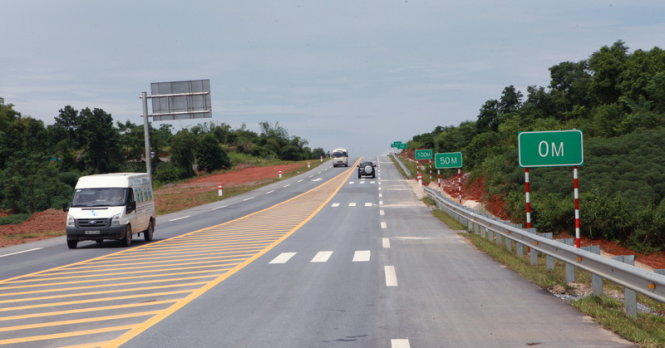Editor’s note: Axel van Trotsenburg, World Bank East Asia and Pacific Regional Vice President, explains why efficient cities play a crucial role in helping Vietnam to transform into a high-income society in this article written exclusively for Tuoi Tre News.
A striking feature of Vietnam’s remarkable progress over the last few decades is the rapid pace of urbanization.
In 1986, there were fewer than 13 million urban residents. Today there are 30 million.
Cities have become strong growth poles, with urban areas growing twice as fast as the national average rate, and contributing over half of the country’s gross domestic product.
The increasing importance of Vietnam’s urban areas in driving growth is not surprising.
It is widely acknowledged globally that urbanization, if managed well, can lead to higher productivity and growth, through positive agglomeration effects such as larger, more efficient labor markets, lower transaction costs and easier knowledge spillovers.
However a closer look suggests that the current urbanization process in Vietnam needs a major rethink to ensure that it contributes fully to the goal of achieving a high-income country.
Vietnam needs to reshape its urbanization process to create more efficient cities – cities that have sufficient population densities, are well connected internally and regionally, and well managed. In addition, in line with Vietnam’s strong preference for social equity, cities will need to ensure inclusion of all residents, with no groups or area “left behind.”
Today, the urbanization of land in Vietnam is fast outpacing the urbanization of people, reducing urban population density and suppressing productivity gains.
The current land conversion-based urban development – with industrial zones developed ahead of demand and proliferation of small-scale, fragmented urban expansion – has surpassed population and job growth. Major cities like Hanoi and Ho Chi Minh City are faced with a sharp imbalance between the city’s core area, where population density can be as high as 44,000 people per square kilometer, and suburban areas with a density that can be as low as 100 people per square kilometer – leading to urban sprawl.
Vietnam’s cities and provinces are like independent oases rather than parts of an integrated marketplace.
For example, it takes nearly two hours to travel from Ho Chi Minh City’s central business district to the center of Binh Duong New City at off-peak hours, a distance of only 40 km. Weak regional connections weigh heavily on economic efficiency and make cities less attractive places to live and conduct business.
Meanwhile, rural residents increasingly lag behind their urban counterparts in income and access to services, leading many to migrate to cities. Migration presents challenges for not only urban management but also opportunities to enhance labor mobility.
Vietnam’s current household registration system means that migrants are not effectively integrated into cities and could over time fuel rising urban poverty and inequality.
Fortunately, these trends can be reversed.
City managers can improve the economic efficiency of their cities by better integrating migrants, through changes in the resident registration system (“ho khau”). Urban renewal and upgrading programs can be initiated to enhance livelihoods and living conditions in low-income neighborhoods.
For example, four years ago, Alley 76 in Ho Chi Minh City was only narrow enough for one motorbike to get through. Store owner Bui Thi Mai knows first-hand how a clean and efficient city can make or break a business. When it rained, the alley was often flooded with floating garbage and mosquitoes. Crime was rampant.
Today, after undergoing major upgrading under an urban renewal project, the street is cleaner, safer and trucks carry goods to her door. Her family income has soared and her life has been completely changed.
Cities can also play a greater role in nurturing a domestic private sector, supporting the growth of firm clusters that can integrate into global value chains, and providing the logistics support to enhance productivity and accelerate growth.
These would lead to higher productivity, greater innovation and the development of a consumer class – all characteristics synonymous with vibrant cities in high-income economies.
To allow urbanization to continue to be an even stronger propeller of Vietnam’s development over the next 20 years, Vietnam would need to recalibrate the roles of the state and the market in managing how the country urbanizes. Here are some suggestions for consideration:
- Refocus the role of the state and improve its capabilities in areas that only the government can manage. These include strengthening the capacities and coordination for urban planning (including information and land use), public finances, and social services, as well as increasing investment in infrastructure to support urban plans.
- Redistribute responsibilities, with powers and resources, among national, local, and metropolitan governments to ensure that issues to be addressed at the regional scale are not undermined by local interests.
- Relax the state’s control and involvement in activities that are managed more efficiently by markets, particularly in the factor markets – those for land – where regulation has produced costly distortions. Here the solution is not new regulations but fewer restrictions.
Over the next two decades, the focus needs to be placed on building and strengthening a vibrant portfolio of cities and towns, which perform mutually complementary functions and reach their potential to become modern, smart and livable and enhance the pace of national economic development.
Vietnam’s cities can indeed deliver on the promise to help Vietnam achieve efficient, inclusive and sustainable growth.






















































